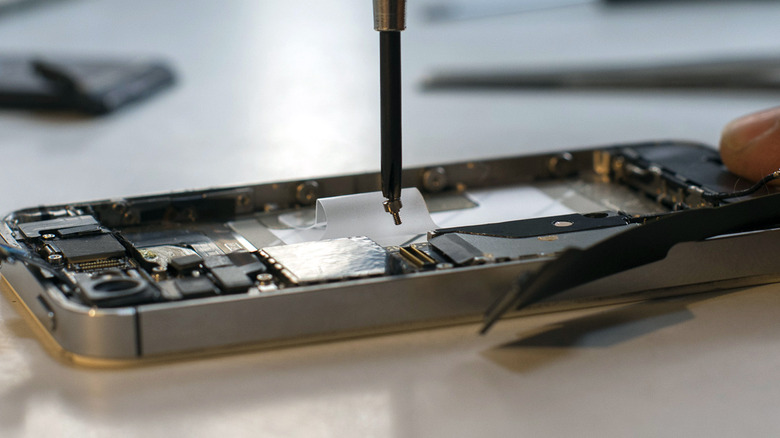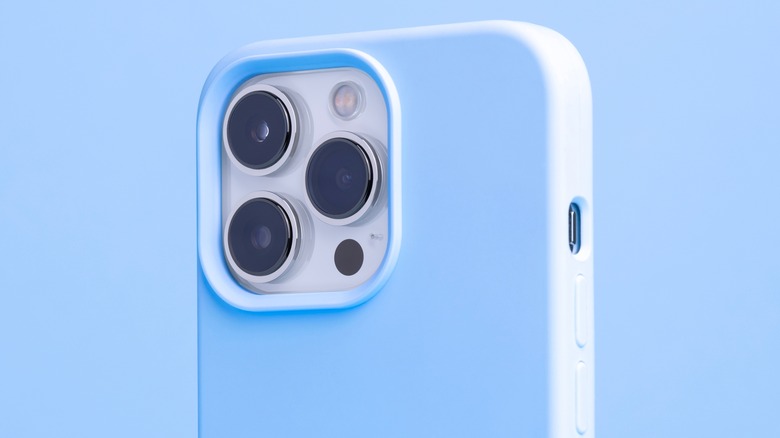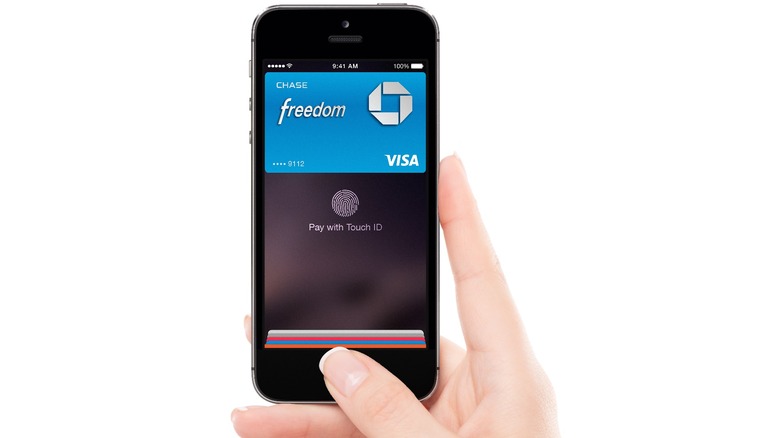There's An Ugly Reality About iPhone Repairs
In April 2022, Apple officially opened its self-service repair store, laying the groundwork for DIY repairs of the famously difficult-to-fix iPhone. Five months later, the repair gurus at iFixit did their usual teardown of the then-newest iPhone — in that case, the iPhone 14 — and were pleasantly surprised to discover that "Apple has completely redesigned the internals of the iPhone 14 to make it easier to repair." This was not at all obvious from looking at the outside of the device, nor had it been a feature promoted by Apple at all. It just happened.
The team did note one issue, though: "We are hearing reports that Apple is continuing their hostile path of pairing parts to the phone, requiring activation of the back glass after installation. You really shouldn't need Apple's permission to install a sheet of glass on a phone that you already own."
That proved to be a harbinger of things to come. In a new blog post, iFixit has announced that it is retroactively changing the iPhone 14's repair score from a seven out of 10 — the highest iPhone score since the iPhone 7 — to a four out of 10. The biggest reason is that pesky parts pairing restriction flagged in the initial teardown.
What exactly is Apple doing?
In its new blog post, iFixit explains that historically, its repairability score was primarily about the physical design of the phone: how easy or difficult it was to physically take apart the phone, remove the defective part, insert a replacement part, and close it back up. However, that didn't take Apple's software-based parts pairing into account.
Basically, when you replace a part on your iPhone 14, it checks with Apple's servers to see if the company has been notified of the repair by way of the part being purchased directly from the manufacturer. If the part wasn't ordered from Apple, then it won't validate, even if it's a genuine Apple part, like one extracted from a recycled phone.
What happens if your part isn't validated/paired? That depends on which part it is. In October 2022, iFixit said that the non-validated replacement screen would function, but with True Tone and Auto-Brightness disabled alongside displaying a warning about the screen possibly not being genuine. With the battery, you'll get the warning while also having the battery health and statistics menus disabled. The front-facing camera, meanwhile, will completely stop working, while the rear cameras work as intended aside from the "genuine parts" warning when you boot the phone. With the logic board, because the serial number won't match the other parts, you'll get various "genuine parts" warnings.
This isn't a new problem, though
As iFixit notes, this problem didn't come out of nowhere. The first pairing issue it encountered was with the iPhone 5s fingerprint sensor in 2013, but since that was seemingly a security concern, the team — perhaps erroneously, they now admit — didn't dock the phone's repairability score for it. Replacement screens not supporting TrueTone or not working outright came next, followed by "locking" batteries to a specific logic board after "Batterygate" happened. At least as of 2018, though, iFixit was still somewhat optimistic that Apple wasn't "sabotaging" third-party repairs.
The iPhone X activated pairing for Face ID's dot projector, but iFixit let it slide, as "we reluctantly made a carveout in our scoring system for security." From there, it just got worse, though: pairing was becoming more prominent throughout the iPhone. There could be only one conclusion, Kyle Wiens writes for iFixit: "One by one, the glitches and bugs add up to a broad strategy, a systematic plan to require Apple's permission to perform any repair on the iPhone."
All of that said, iFixit still praises the actual physical design of the iPhone 14 — which has been adopted for the entire iPhone 15 line, as well — making it a lot easier and thus less expensive to repair something like the rear glass. Regardless, the team reevaluated their scoring system to include consideration for this kind of software lock, and though they're not re-rating any older iPhones right now, they note that "if we did, their scores would also likely decline."


